(April 17, 2025) On a misty morning in rural Tamil Nadu, a man in a simple cotton shirt pedals his bicycle down a dirt lane, past lush paddy fields and curious onlookers. Dressed in a traditional veshti and often barefoot, he could be mistaken for a local farmer on his way to the fields. In reality, this is Sridhar Vembu, the founder of Zoho Corporation, who has traded in the hustle bustle of Silicon Valley for the calm of Mathalamparai, a tiny village in Tenkasi district. Vembu begins his day at 4 a.m., holding conference calls with colleagues in California; by sunrise, he’s wandering the countryside, sometimes even catching snakes that cross his path. It’s not the kind of routine you’d expect from a billionaire tech founder. But it reflects how Sridhar Vembu chooses to live—close to the ground, away from the noise. His journey stretches from research labs and offices in the U.S. and a brief teaching job in Australia, to the quiet villages of Tamil Nadu where he now lives and works. At a time when most startups aim for fast growth and city life, Vembu has taken a different path — one built on simplicity, self-reliance, and being part of a community. He didn’t just return for a quieter life — he came back to build something meaningful, to bring opportunities to places that are often left behind.
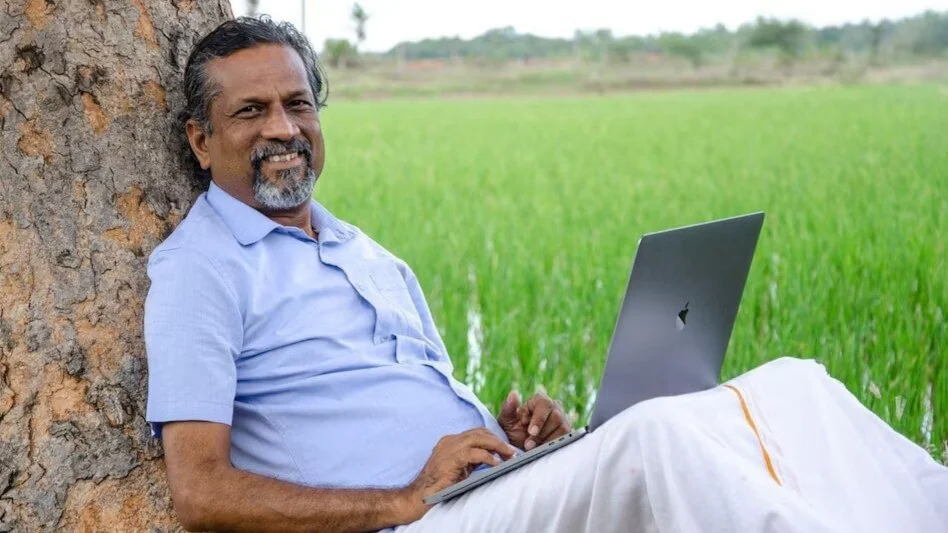
Sridhar Vembu
Princeton to Qualcomm: An Academic Mind in a Corporate World
Sridhar Vembu was born in 1968 into a middle-class family in Tamil Nadu, where education was always a priority. He studied in schools in Thanjavur district, went on to IIT Madras, and later earned a PhD in electrical engineering from Princeton University in the US. Later, he briefly took up a teaching job at the Australian National University in Canberra. But just two weeks in, he realised it wasn’t for him and decided to leave. He later told students, “Don’t think hard about what you could have done differently. Keep looking forward to what the future has in store for you.” With that mindset, he stepped away from academia and moved towards the fast-changing world of tech and business.
He moved back to the United States and entered the tech industry as a wireless engineer with Qualcomm in San Diego. By the mid-1990s, he had moved to California’s Bay Area, living in places like San Jose and Pleasanton, right in the heart of the tech boom. While many startups were chasing fast growth with loads of venture capital, Vembu noticed that a lot of them lost focus and struggled to build something lasting. He had a different idea—he wanted to build a company slowly and steadily, without outside investors.
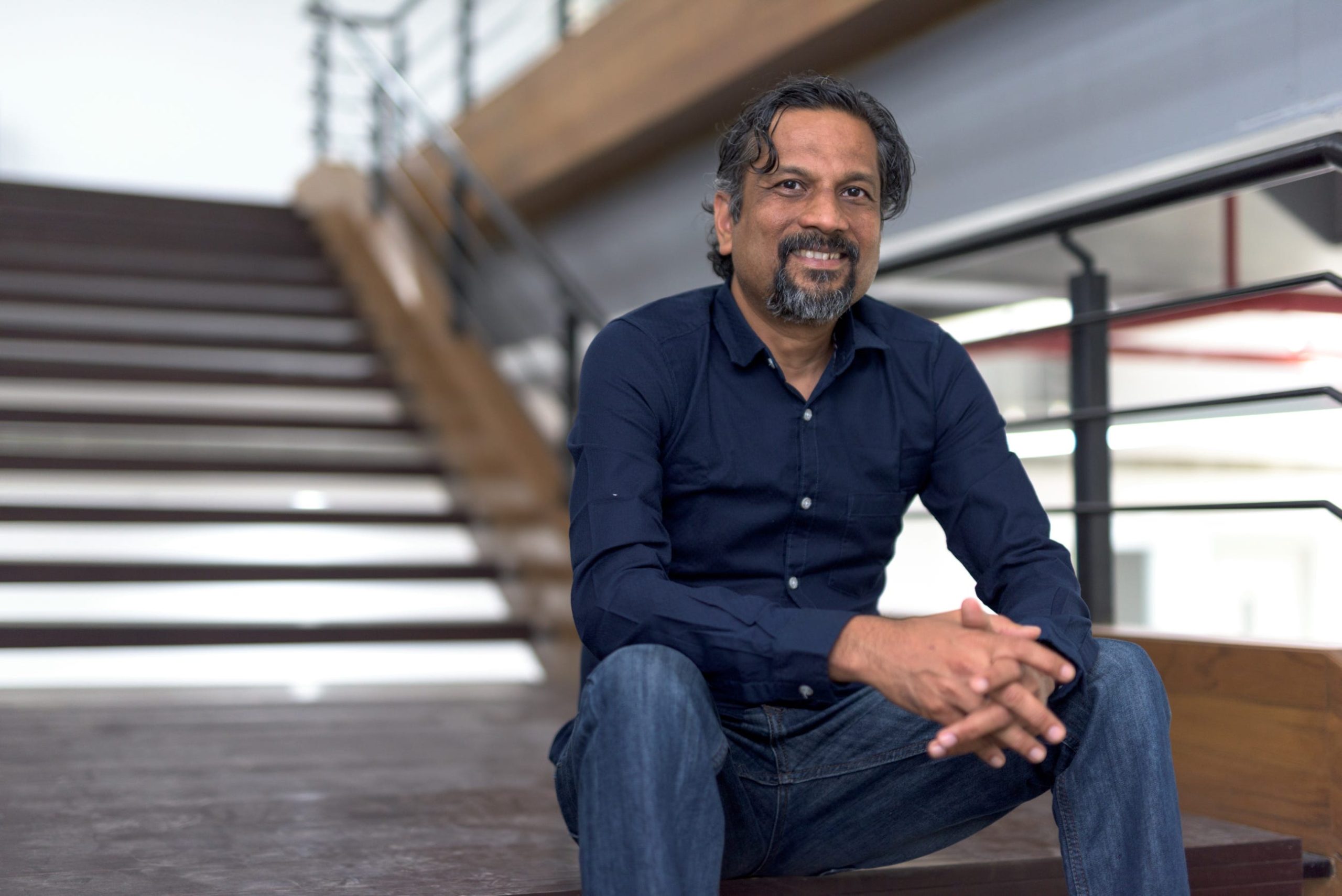
Building Zoho: A Quiet Rise in the US Tech Scene
In 1996, along with his brothers, he started a software company called AdventNet. They focused on network management tools for businesses, launching the company with limited money but a clear vision. At a time when most startups were chasing headlines, AdventNet quietly got to work.
Over the next several years, Vembu began expanding the company beyond just IT tools. In 2009, he renamed it Zoho Corporation, after one of its popular products, to reflect its growing range of online business software. Zoho quietly became a global SaaS company, offering everything from CRM to accounting tools—all built without a single rupee of venture capital. That kind of growth without outside funding was rare in the tech world.
By the late 2010s, Zoho had launched more than 40 apps and served tens of millions of users around the world. It had offices not just in India and the US, but also in Japan and Australia. Despite leading a global company, Vembu stayed out of the spotlight. He was known for his simple lifestyle, often walking around the office barefoot—a habit that earned him the nickname “the Barefoot Billionaire.” But behind that simplicity was a strong belief: Zoho should stay profitable, private, and true to its values, answering only to its customers and employees—not investors or stock markets.
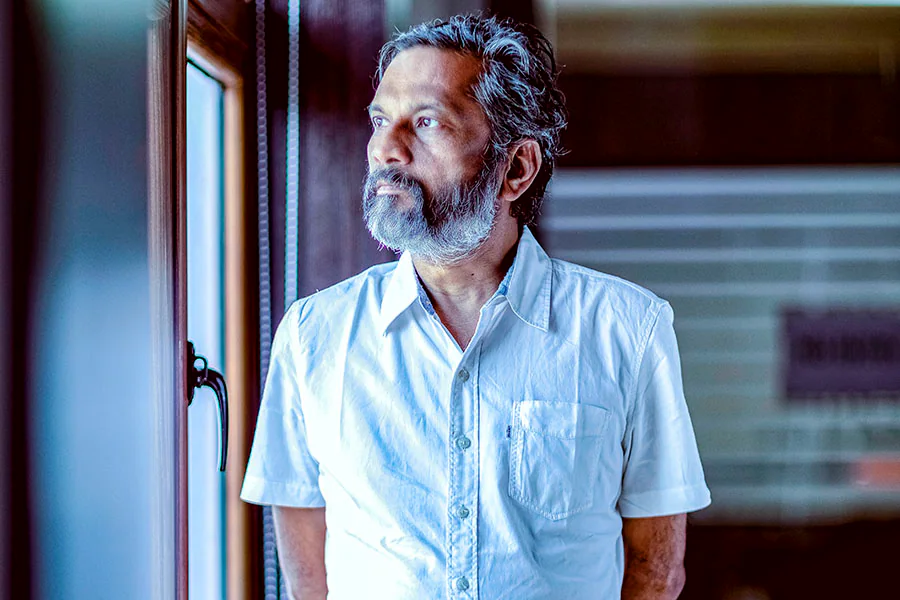
Return to Roots: Relocating to Rural India
Even though Zoho’s main offices were in California and Chennai, Vembu always felt drawn back to his roots. After living in the U.S. for over two decades, he decided in 2019 to return to Tamil Nadu. He moved from the Bay Area to Mathalamparai, a small village in the south, and shifted Zoho’s operations there as well. The move surprised many in the tech world, but for Vembu, it was something he had been thinking about for a long time.
“I always thought that people migrating from villages to cities is not a good idea,” he told Forbes India. Instead of asking young people to leave their hometowns to find work, he wanted to take jobs to where they lived. His idea was to set up small offices in rural areas where 10 to 20 people could work, as long as there was decent internet. This was before remote work became common. Vembu was already putting into practice what he called “work from village,” an idea that would soon become part of Zoho’s way of working.
Community and Company Go Hand-in-Hand
Sridhar Vembu’s return to India wasn’t just about growing his business—it was also about making a difference in the community. Even before he moved back, he had started working on this idea. In 2004, Zoho launched an in-house training program called Zoho University (now Zoho Schools of Learning) to help young people who didn’t go to college. The program trained high school graduates in skills like coding and design, and many of them went on to become top performers at the company.
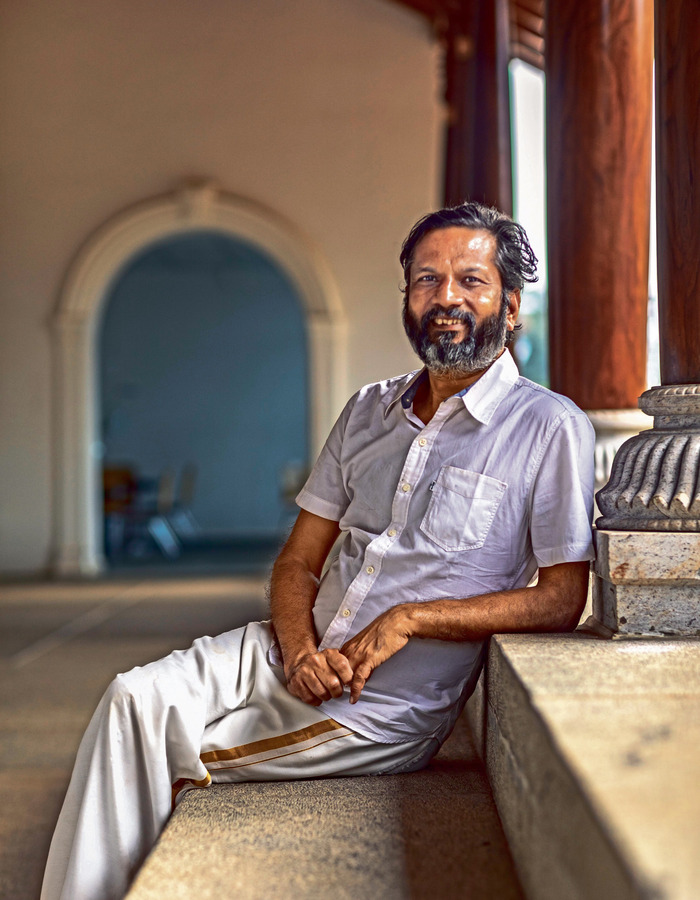
Some of these trainees came from very modest backgrounds, and a few even ended up leading teams. Vembu believed that skills mattered more than degrees. Just like he chose not to take venture capital, he also questioned the idea that you need a fancy college education to succeed in tech. By 2020, around 15–20% of Zoho’s engineers didn’t have a traditional degree—a rare thing in the software world. Most of them came from Zoho’s own training centers in places like Chennai and Tenkasi, showing how the company had become deeply connected to the communities around it.
In Mathalamparai, Vembu started teaching a few local children during the Covid-19 lockdown, when schools were shut and many couldn’t afford online classes. What began as informal lessons soon grew into a full-fledged rural school. By late 2020, he had hired four teachers and enrolled over 50 students.
He called it a “rural school start-up,” focused on real learning and nutrition rather than exams. Students were grouped by what they knew, not their age, and everyone got a mid-day meal. “How can you learn anything when you are hungry?” he said. During the same time, Zoho also stepped in to provide thousands of free meals to nearby villages—an effort Vembu actively supported.
Through all this, Sridhar Vembu has managed to be a CEO, a teacher, and a supporter of his local community. In January 2021, he was awarded the Padma Shri for his work in business and social impact. But the recognition didn’t change his routine. The next day, he was back teaching kids under a tree and joining video calls with his team at Zoho, just like any other day.
A Philosophy of Self-Reliance and Simplicity
Sridhar Vembu’s journey across countries is tied together by a clear and steady belief in self-reliance—whether for people, communities, or businesses. In the U.S., this meant building Zoho without relying on investors, focusing instead on long-term work. In India, it meant helping villages grow so that young people don’t have to leave for city jobs.
He often talks about reversing the “brain drain” from small towns. “It is not possible to replicate Silicon Valley everywhere,” he once said, adding that each place should find its own way to grow. In Tenkasi, he’s doing just that—showing that a global tech company can operate from a small town, even a remote village. By 2020, around 500 Zoho employees were working from rural offices in Tamil Nadu and Andhra Pradesh, proving that great software doesn’t have to come from big cities like Bangalore or San Francisco.
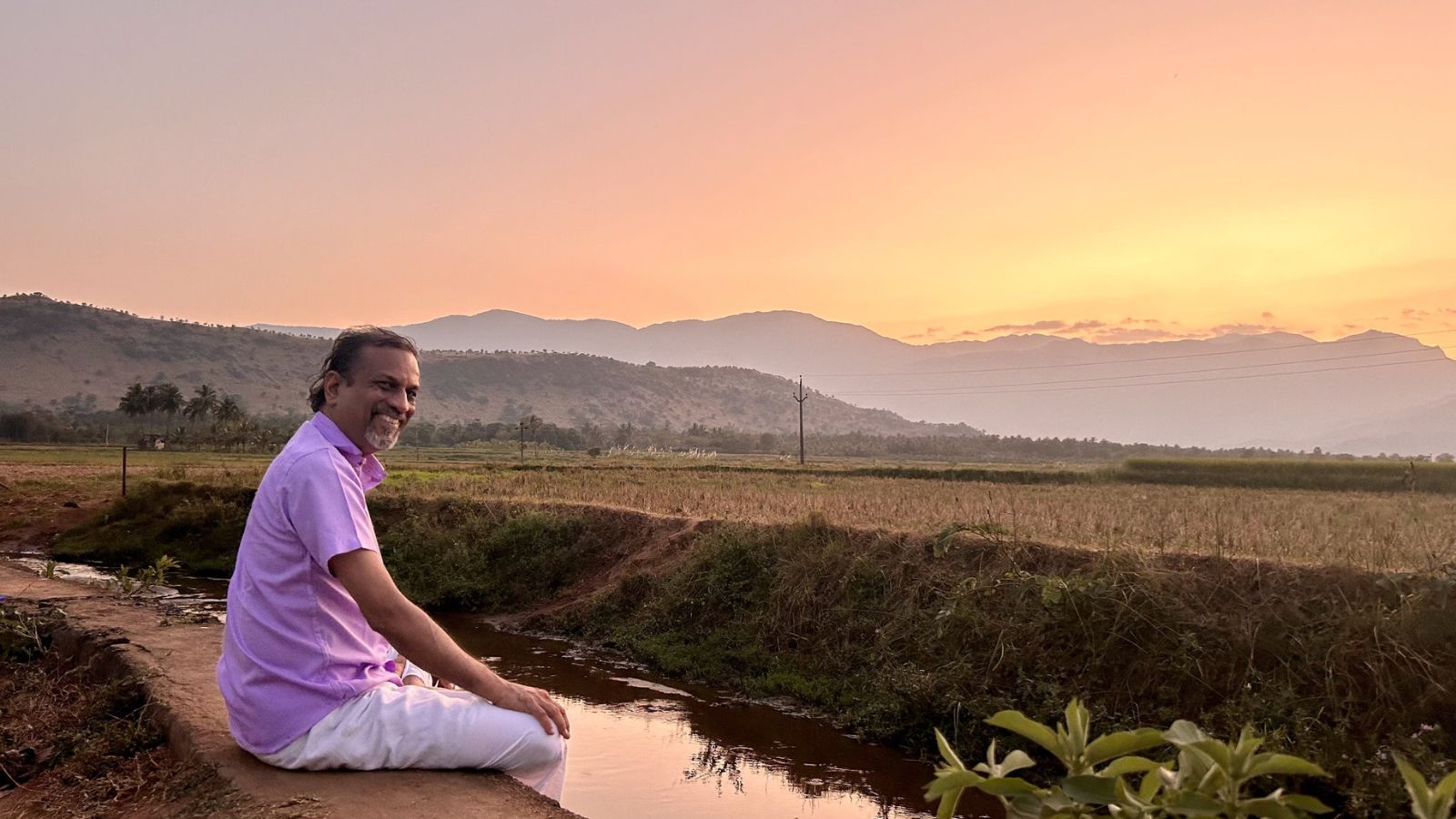
Sridhar Vembu’s path has been far from typical. He reached the heights of academic and tech life in the U.S., but chose to return to India to build something more meaningful. His story connects two very different worlds—high-end cloud software and the quiet life of an Indian village.
Whether writing code or chatting with a farmer under a tree, Vembu moves easily between the two. He blends tech skills with a deep sense of social purpose. His journey offers a different kind of tech story—one that shows innovation doesn’t have to come from big cities, and that going back to your roots can lead to new ways of thinking. In the narrow streets of Tenkasi, where kids cycle to school and software engineers work from village homes, his ideas are clearly taking shape. By showing that a global tech company can grow from rural India, Vembu has started a quiet shift in how we think about the future of both technology and community.
ALSO READ: From Microsoft US to Indian Agriculture: How Ruchit Garg is using AI and tech to transform farming




